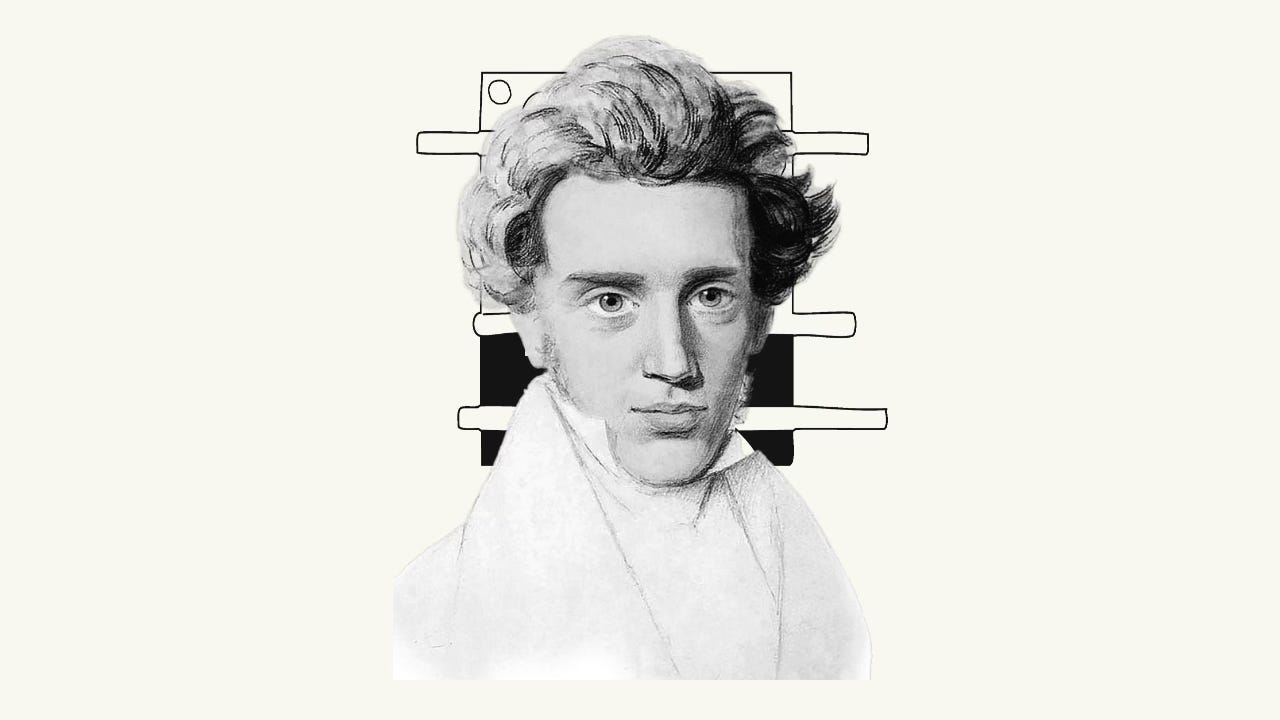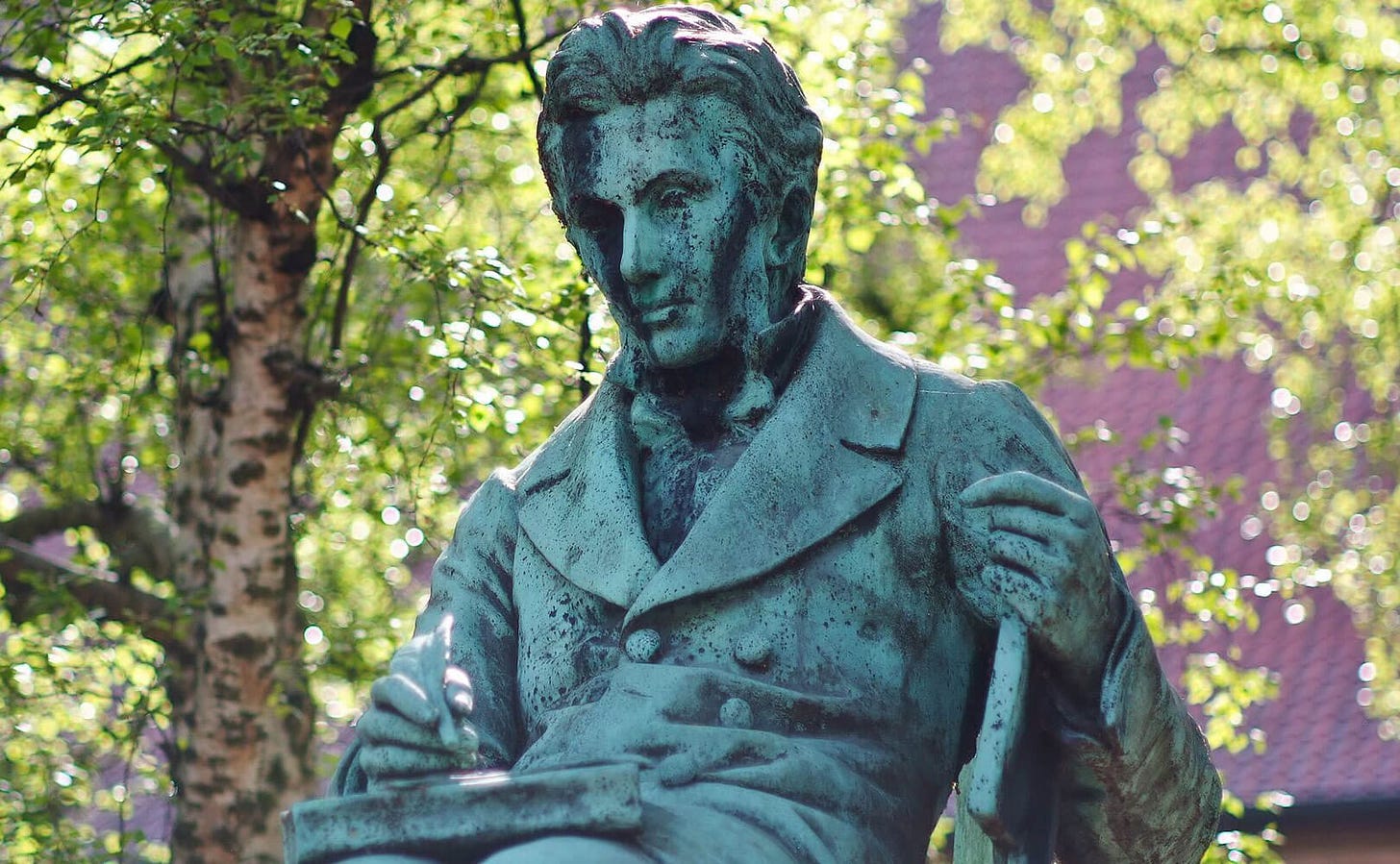Kierkegaard: Complacency to the Point of Paralysis
An Interpretation of the Philosopher's Work: The Present Age
READING TIME: 5 MINUTES
Søren Kierkegaard: A Brief Introduction
Philosopher Søren Kierkegaard was born in 1813 in Copenhagen, Denmark, as the youngest of seven children. Many of his siblings died young, which led his strict and religious father to believe their bloodline was cursed, doomed to see none live beyond Christ’s age of 33. This belief instilled in Kierkegaard a profound fear of aging, as he too believed such a fate awaited him. He was reportedly surprised when he reached his 34th birthday.
Kierkegaard’s philosophy was deeply shaped by his personal life, which included a rigorous Lutheran upbringing, a broken engagement, and a lifelong struggle with melancholy.
His ideas have influenced much of Western philosophy, theology, and literature. Known for his penetrating insights into human psychology and the nature of existence, he rejected the prevailing philosophical systems of his time, instead interpreting the innate desires and needs arising from the human heart.
Among his works, The Present Age stands out as exceptionally relevant, offering a lens through which we can better understand the issues of our current society. In it, Kierkegaard’s exploration of the modern condition and the dilemmas of faith, choice, and freedom has left a lasting impact.
Understanding “The Present Age”
In The Present Age, Kierkegaard examines what he views as a profound shift in culture and society, critiquing his era as one increasingly steeped in superficiality and spiritual complacency. He characterizes it as an “age of reflection” rather than an “age of passion.”
His concept of the “age of reflection” describes the behavioral patterns he observed around him: a time he saw as lacking genuine conviction, where people were more inclined to discuss ideals than to commit to them wholeheartedly. By contrast, the “age of passion” refers to those who act upon their convictions, even when such actions oppose the consensus of the masses.
Kierkegaard’s primary critique is centered around what he calls “leveling,” a process by which character and authenticity are reduced by societal expectations and the collective pressure of society. He describes this as a flattening effect, where originality, courage, and uniqueness are “leveled” to fit a common mold.
Leveling creates a world in which people hesitate to stand out— to speak passionately, to act decisively, or to commit to what is right; fearing ridicule or alienation from the collective.
For Kierkegaard, this emphasis on complacency over duty paralyzes the ability to make meaningful choices, ultimately creating a culture more concerned with public perception than with consistent moral initiative. In his ideal, the members of society would lower this reflective state in their way of thinking and instead act with passion, treating everything important in life with courage.
Thus our own age is essentially one of understanding, and on the average, perhaps, more knowledgeable than any former generation, but it is without passion. Every one knows a great deal, we all know which way we ought to go and all the different ways we can go, but nobody is willing to move. *
Our Current Age Compared to “The Present Age”
Kierkegaard’s observations in The Present Age feel especially relevant today, as our society mirrors many of the traits he identified in 19th-century Denmark. The leveling process he feared seems to have intensified in our current age, where original thoughts and expressions are often drowned out by dominant trends that overwhelm the mind and pressure individuals to conform.
A key way Kierkegaard’s critique resonates today is in our society’s tendency toward passive engagement and facade-driven action. People often proclaim loyalty to causes without conducting even a basic epistemological inquiry into what those causes truly require or represent. This results in a superficial commitment, lacking both depth and moral consistency.
Furthermore, the weakened sense of community has led individuals to prioritize personal gratification and glory, behaving as if this planet hosts only them. This shift has resulted in many constructing barriers that distance them from reality—avoiding spaces where actions carry real consequences and demand true conviction. For some, this manifests as retreating behind screens, disconnected from the needs of those around them.
Kierkegaard’s critique of the reflective age’s tendency toward inaction and indecision is equally relevant in our current information-saturated world. Now, with constant access to information, people often feel overwhelmed by choices and paralyzed by the fear of making the wrong one, leading to inaction rather than meaningful steps forward. This state of perpetual indifference leads to a lack of integrity as life is largely an ocean of choices and no choice is just as unwise as selecting the unethical choice.
Kierkegaard’s warning is as timely as ever in a world where complacency is often carried till the end of a life. In societies that prioritize comfort and conformity, it is all too easy to passively adopt popular opinions or lifestyles instead of wrestling with what we truly believe or value. Rejecting this complacency awakens in individuals a desire to pursue a higher, perhaps divine, ideal.
I take his reflections as reminders to approach life with more intention and sincerity. In applying Kierkegaard’s wisdom, we remind ourselves of the importance of commitment and the dangers of conformity. In conformity, I become paralyzed. To be paralyzed is to renounce my duty to choose.
Questions to Consider
Am I stuck in a stage of “reflection”?
How can my convictions be informed further?
How can I resist my inclinations to become complacent?







Re-reading this again - Kierkegaard points this out in Fear and Trembling as well. There is certainly a correlation to complacency and despair. When the self is ignorant or chooses to defiantly ignore and waste potential instead of actualizing the true self, despair seeps into living in hopelessness and isolation. Which here connects The Present Age, that complacency is the result of the crippling effects of despair since the self cannot confront despair, it cannot commit to face the hell of self in order to be the true sincere self...
Good post!
What’s some advice for reading Kierkegaard?